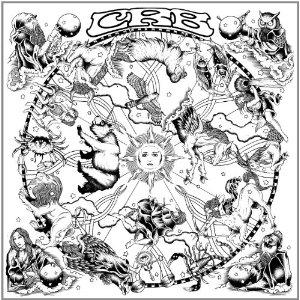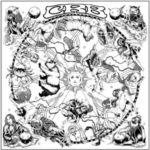
Silver Arrow Records
In a move that any profit-driven record label would consider commercial suicide, the Chris Robinson Brotherhood have followed up their debut album with a second album just three months later. The new one, The Magic Door, is culled from the same productive recording sessions that yielded their debut, and finds the band performing with the same fresh eagerness for exploring what they can create together. With the Chris Robinson Brotherhood, Robinson leaves behind the heavy blues of his days with The Black Crowes in favor of a sound that’s mellower and loose with rich jamming.
A cover of Hank Ballard’s “Let’s Go Let’s Go Let’s Go” starts things off with swinging, old school rock and roll and sets the tone for what’s to come as Robinson hollers “Oh what a time it’s gonna be.” At the end of the song, Robinson coins a phase “California space boogie” which seems as good as any to describe the band’s sound. Even if The Magic Door never rocks too hard, there is plenty of boogie mixed in with exploratory jams and mournful country rock ballads.
Robinson is joined by lead guitarist Neal Casal, Black Crowes keyboardist Adam MacDougall, drummer George Sluppick and bassist Mark Dutton in the Chris Robinson Brotherhood, and the band, fresh off a year of constant touring, was firing on all cylinders when they hit the recording studio. They carried their live approach into the studio, and these songs breath with plenty of fine playing as Casal and MacDougall embellish Robinson’s songs with wild colors.
The nearly fourteen minute “Vibration & Light Suite” eventually plunges off the hippie deep end with sample voices and seagull sound effects, but not before moments of transcendence from Neal Casal. With a riff that evokes the Grateful Dead’s “Eyes of the World,” “Vibration & Light Suite” is the album’s jam vehicle. MacDougall contributes a few funky solos before Casal pushes the song into a new, slightly dissonant stratosphere with smoldering psychedelic bursts of guitar. Though he lets loose on “Vibration & Light Suite,” Casal’s playing is perhaps a touch more reserved here than on Big Moon Ritual, while keyboardist Adam MacDougall takes a few more solos. But Casal’s playing remains a constant highlight, from his heavenly jamming on “Vibration & Light Suite” to a brazen, searing solo on “Someday Past The Sunset” and tasty, melodic playing on “Appaloosa.”
Robinson himself sounds as soulful as ever, though far from the youth angst driven howler of his early days with The Black Crowes. Few bands can match the young Black Crowes’ raw power and intensity and the Chris Robinson Brotherhood don’t try. Robinson won’t demand your attention with ear-throttling wails and screams anymore, instead easing his way through these songs with relaxed, rootsy vocals. He still manages to work up a snarl on “Someday Past The Sunset,” but his voice has also developed a slightly tender sweetness with age, which shines through in ballads “Appaloosa” and “Sorrows of a Blue Eyed Liar.” He’s at his absolute best on album closer “Wheel Don’t Roll,” as his earthy, crackling voice leads the band through a flowing gem of Appalachia campfire country. From his singing to the band’s spacey nature and swinging beat, everything in the Chris Robinson Brotherhood simply fits. Music industry conventional wisdom be damned, this album was too good to not release immediately.



No Comments comments associated with this post